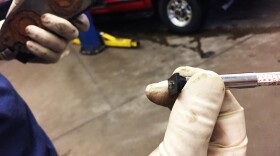This year marks the 75th anniversary of the New Hampshire State Police.
At the State Police Headquarters, case file boxes tower towards the ceiling in the Cold Case Unit. Volunteer Milli Knudsen says sometimes she can’t believe the way the State Police department used to investigate crimes.
“We’ve seen photographs, old photographs of the police officer who responded to the scene and here he is with a bare hand holding something up for the camera and you’re looking at that going ‘Oh great! That’s not gonna help!’ But they didn’t know that then. Who would’ve thought?”
Chain of custody rules for evidence didn’t exist in the not-too-distant past. People didn’t know what DNA was, or how to preserve it. This makes the job for the State Police’s cold case detectives that much harder.
The head of the Cold Case Unit, Sergeant Scott Gilbert says case information was rarely stored in a single place. So, files have to be collected from local law enforcement, the medical examiner’s office, the Attorney General’s office, and sometimes even the garage of a retired detective.
“You pick a case from, say, 1975, and now you have a box of hand-written reports, floppy discs, VHS tapes, audio cassettes…”
Three years ago, Governor Lynch signed into law the creation of a four-man team of three detectives and a prosecutor. The Cold Case Unit became part of the now 75-year-old State Police department. A department that traces its roots even further back, says retired Major Ernie Loomis.
“The quest began to establish a state police in eighteen sixty nine.”
It was four years after the end of the Civil War. Ulysses S. Grant is President and, incidentally, it was also the year DNA was first discovered.
Loomis says that although it was about 50 years before prohibition, alcohol was already seen as a source of trouble.
“One of the established reasons put forth to begin a state police then was to suppress gambling houses, drinking establishments and houses of ill fame.”
The legislature passed the act and placed it on the ballot for a statewide referendum.
“And sadly, the voters of New Hampshire, them being only the male voters, rejected it resoundingly over two to one.”
Fast forward to the depression era.
Bonnie and Clyde are on their criminal tear across the rural and poorly policed parts of the country. As the interstate highway system begins to grow and automobile use becomes virtually universal, the problems of the time change. In New Hampshire, most rural towns had no police station to speak of and the only uniformed officers who watched the roads were vehicle inspectors for the DMV, with no powers to arrest suspects or investigate crimes.
“For its time, in 1937, there were a lot of violent business robberies, armed robberies, shootem-out, high speed chases, all kinds of things like that. Primarily because those outlying areas seemed to be relatively defenseless.”
The proposal to create a state police came up again. It passed a few months later and Governor Francis Murphy signed it into law.
“And they formed a miniscule group of around forty initial troopers who were sworn in July first, 1937… And some of the earliest events that the State Police had, involved shootouts with murderers and robbers.”
Since then, the State Police has gone through big changes. In the 1960s and '70s, illicit drugs, social unrest and fears of domestic terrorism focused much of the State Police’s energies, providing basis for expansion. And by the '80s, height and weight requirements were lifted to admit more female troopers.
Now, State Troopers drive so-called Smart Cruisers with voice activated controls. And what started as a group of 44 men, is now more than 350 men and women.
And back at the Cold Case Unit, they’re using today’s technology to solve yesterday’s crimes. But, Sergeant Gilbert says today’s technology will always seem a step behind.
“Advancement in phones and GPS and satellite tracking… three years from now people are going to be looking back at us and saying we’re archaic.”
No matter how the technology changes, the State Police say they’ll remain focused on the same thing they were 75 years ago—keeping New Hampshire citizens safe.














